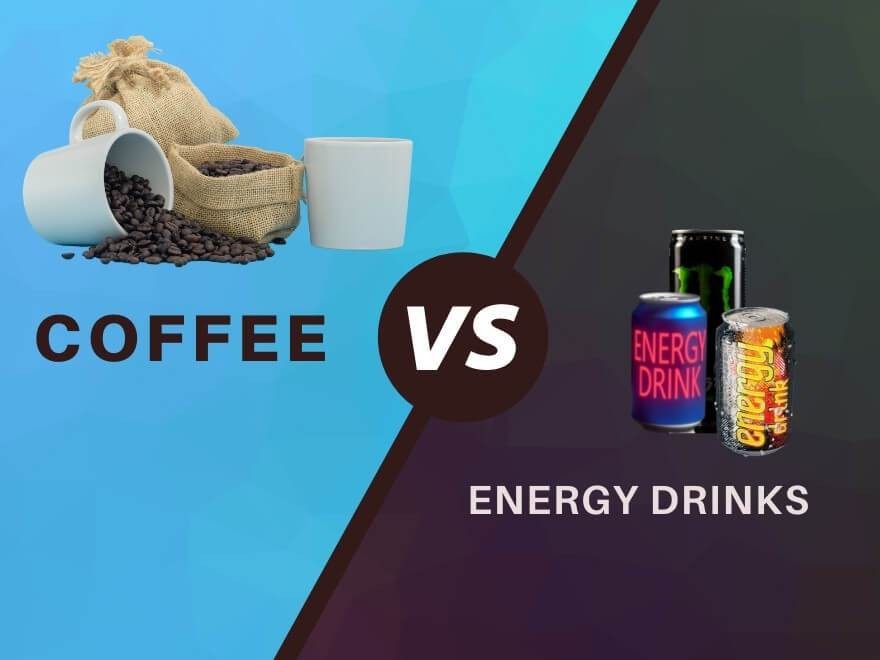If you’re looking for a quick boost of energy, coffee is your best bet. Energy drinks offer a similar boost but include many other ingredients, including herbal extracts and sugars Coffee Vs Energy Drinks.
Coffee is a natural stimulant that can also provide healthy nutrients such as magnesium, potassium and vitamin B2. In addition to having more control over the ingredients in your drink, coffee lovers have more options for customization.
Caffeine Content

While coffee is brewed from the beans of the coffee plant, energy drinks use a blend of ingredients to achieve their energizing effects. The caffeine content of both beverages can be high, but the difference in the amount that is absorbed into your system depends on how fast you consume them.
According to a study conducted by William & Mary professor James White, the speed and temperature of consuming your beverage can impact how much caffeine is absorbed into your bloodstream. A cup of coffee typically has a lower amount of caffeine, but it depends on your preferred coffee bean type and roast level, brewing method and water amount.
Energy drinks often promise to enhance your mental and physical performance, but they also contain large amounts of sugar, which can have negative health consequences if consumed in excess. Some people may develop a psychological or physical addiction to energy drinks, and excessive intake can cause symptoms such as trembling, rapid heart rate and jitteriness. Large amounts of caffeine may also trigger heart arrhythmias in some people, especially if you already have cardiovascular disease or take medications for heart conditions.
Calories
The energy drinks chilling in the cooler section of your local gas station contain more than just a caffeine boost. Many contain a lot of sugar, as well as other ingredients that may not be good for you. Coffee is a much healthier choice, and you can control how sweet or creamy it is to suit your preferences.
In addition to the regulated caffeine buzz, coffee also contains healthy nutrients such as niacin, magnesium, potassium and vitamins B2 and B5. Several studies have shown that consuming large amounts of caffeinated beverages can increase the risk for heart arrhythmias, which are abnormal electrical impulses that affect your heartbeat.
Both coffee and energy drinks can add calories to your daily intake, so make sure you watch the amount of each beverage you consume. In some cases, excessive consumption of either can lead to health problems, including heartburn and indigestion. It’s important to see a medical professional if you are relying on caffeinated beverages for energy, because there may be an underlying condition that needs to be addressed.
Sugar
Coffee and energy drinks both provide a jolt of caffeine, but the difference is in how much sugar they contain. While coffee contains a small amount of sugar, energy drinks have a lot of added sugar which can cause sugar crashes that can undo the initial boost in energy.
In addition to the sugar content of energy drinks, they also have a lot of calories, which can be detrimental to health in the long run. Coffee, on the other hand, has very few calories and is a great option for those who are looking for a low-calorie pick-me-up.
It’s worth noting that the high amount of sugar in energy drinks can be dangerous for people with heart conditions such as arrhythmia. Drinking large amounts of these drinks can increase the likelihood of developing an irregular heartbeat, and in some cases, may be life-threatening. For this reason, coffee is often recommended as a healthier alternative to energy drinks. However, it’s important to consider your individual energy needs and whether coffee or an energy drink is the best option for you.
Nutrients
Coffee has been consumed for centuries and is a naturally occurring stimulant that gives the brain and body an instant boost of energy. On the other hand, energy drinks are a fairly new beverage that is often associated with negative health impacts. Many people who are looking for a pick-me-up reach for an energy drink but fail to realize that they are also consuming high amounts of sugar and other harmful ingredients.
Energy drinks contain a combination of caffeine, sugar, amino acids and other natural and artificial preservatives, flavors and dyes. The sugar content in many energy drinks is quite high, with a Monster energy drink containing up to 54 grams of sugar (almost 13.5 teaspoons!) A diet that contains too much sugar can lead to obesity and numerous health problems, including heart disease, type 2 diabetes and even cancer.
A cup of black coffee with no added sugar is calorie-free and healthy, providing energy that will keep you going without a resulting sugar crash. However, if you are constantly reaching for energy drinks it could be a sign of underlying issues and it’s important to talk to your doctor about it.
Is there a winner?
In the symphony of daily buzzes, both coffee and energy drinks compose their own energetic melodies. 7-Eleven serves up both with steamy cups and ice-cold cans, giving you the gusto to tackle your day’s tasks.
The high levels of sugar and added sweeteners in energy drinks can provide a quick boost, but the sugar crash that follows can lead to sugar cravings and a sluggish mind. The caffeine found in coffee can deliver a more moderate level of energy that lasts longer, and if you’d like to sweeten your drink with an approved artificial sweetener, you have a variety of choices that are lower in calories than sugar.
Adding your own milk or creamer to your coffee also gives you the ability to regulate exactly what goes into your beverage, which is an important factor in a healthy diet. Additionally, coffee is often less expensive than energy drinks. In fact, purchasing a 2lb bag of coffee at home can save you as much or more than buying 65 energy drinks. This can help you stick to your budget.
